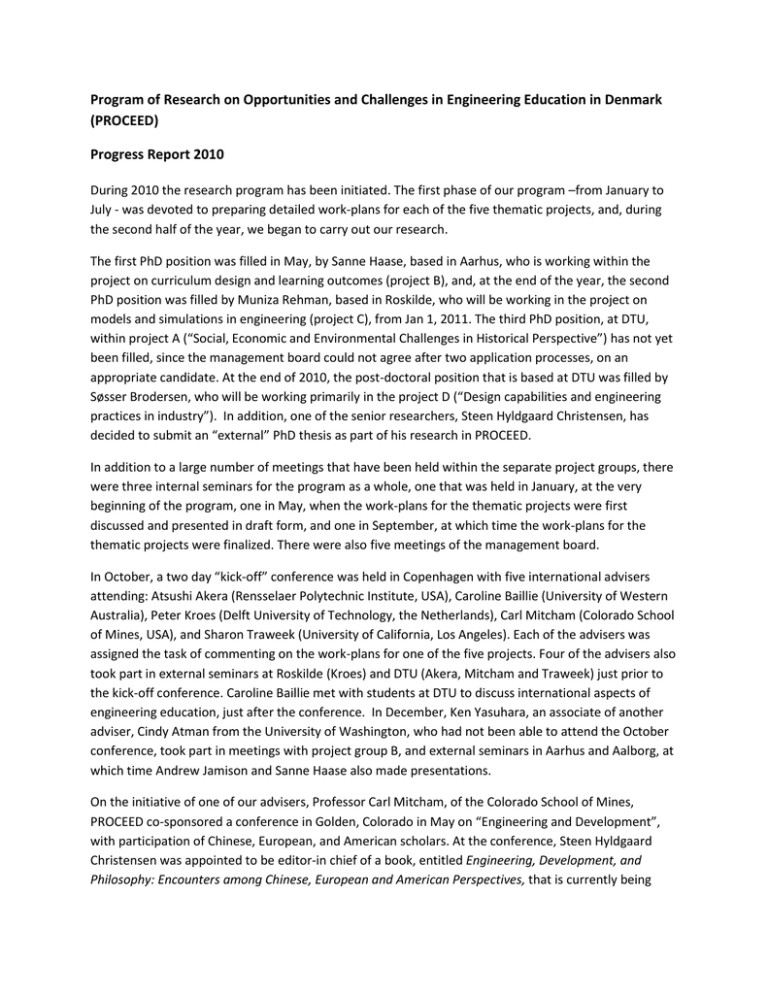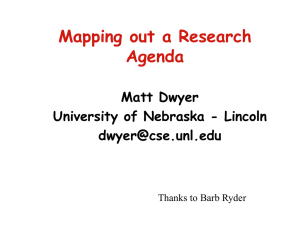Progress report 2010
advertisement

Program of Research on Opportunities and Challenges in Engineering Education in Denmark (PROCEED) Progress Report 2010 During 2010 the research program has been initiated. The first phase of our program –from January to July - was devoted to preparing detailed work-plans for each of the five thematic projects, and, during the second half of the year, we began to carry out our research. The first PhD position was filled in May, by Sanne Haase, based in Aarhus, who is working within the project on curriculum design and learning outcomes (project B), and, at the end of the year, the second PhD position was filled by Muniza Rehman, based in Roskilde, who will be working in the project on models and simulations in engineering (project C), from Jan 1, 2011. The third PhD position, at DTU, within project A (“Social, Economic and Environmental Challenges in Historical Perspective”) has not yet been filled, since the management board could not agree after two application processes, on an appropriate candidate. At the end of 2010, the post-doctoral position that is based at DTU was filled by Søsser Brodersen, who will be working primarily in the project D (“Design capabilities and engineering practices in industry”). In addition, one of the senior researchers, Steen Hyldgaard Christensen, has decided to submit an “external” PhD thesis as part of his research in PROCEED. In addition to a large number of meetings that have been held within the separate project groups, there were three internal seminars for the program as a whole, one that was held in January, at the very beginning of the program, one in May, when the work-plans for the thematic projects were first discussed and presented in draft form, and one in September, at which time the work-plans for the thematic projects were finalized. There were also five meetings of the management board. In October, a two day “kick-off” conference was held in Copenhagen with five international advisers attending: Atsushi Akera (Rensselaer Polytechnic Institute, USA), Caroline Baillie (University of Western Australia), Peter Kroes (Delft University of Technology, the Netherlands), Carl Mitcham (Colorado School of Mines, USA), and Sharon Traweek (University of California, Los Angeles). Each of the advisers was assigned the task of commenting on the work-plans for one of the five projects. Four of the advisers also took part in external seminars at Roskilde (Kroes) and DTU (Akera, Mitcham and Traweek) just prior to the kick-off conference. Caroline Baillie met with students at DTU to discuss international aspects of engineering education, just after the conference. In December, Ken Yasuhara, an associate of another adviser, Cindy Atman from the University of Washington, who had not been able to attend the October conference, took part in meetings with project group B, and external seminars in Aarhus and Aalborg, at which time Andrew Jamison and Sanne Haase also made presentations. On the initiative of one of our advisers, Professor Carl Mitcham, of the Colorado School of Mines, PROCEED co-sponsored a conference in Golden, Colorado in May on “Engineering and Development”, with participation of Chinese, European, and American scholars. At the conference, Steen Hyldgaard Christensen was appointed to be editor-in chief of a book, entitled Engineering, Development, and Philosophy: Encounters among Chinese, European and American Perspectives, that is currently being written and is to be published by Springer Verlag. Andrew Jamison, Matthias Heymann, Anders Buch, and Ulrik Jørgensen have written contributions for the book, and there are now plans for PROCEED members to take part in a conference in Beijing at the Graduate School of the Chinese Academy of Sciences in October, 2011 as a follow-up to the workshop in Golden. Both meetings have dealt with the challenges facing engineering and various aspects of engineering education and are thus highly relevant for PROCEED. In particular, it is expected that the meeting in Beijing will provide insights into Chinese engineering and engineering education which will be valuable for our research. In addition to the so-called ACE (for “American, Chinese and European”) book, there have been a number of publications already produced during the first year. As part of the initial planning phase in PROCEED, Andrew Jamison taught a course on perceptions of technology at DTU during the spring term 2010. Afterwards he offered to turn his lectures for that course into a book for a series of lectures in book form for engineering students, “Engineering, Technology and Society” that is edited by Caroline Baillie, one of our international advisers, for Morgan & Claypool Publishers in the United States. The manuscript, entitled A Hybrid Imagination: Science and Technology in Cultural Perspective is currently being finalized and will be published in 2011. It presents an overview of the history of science, technology and engineering as well as a discussion of the more recent changes in the cultural contexts of science and engineering education. As such, the book provides a frame of reference for PROCEED as a whole, and, more specifically, for the research that is being carried out in project A. In the course of writing the book, Steen Hyldgaard Christensen joined Andrew Jamison as a co-author, along with Lars Botin, who has joined the group in Aalborg working in PROCEED. As part of project A, “Social, Economic and Environmental Challenges in Historical Perspective,” Andrew Jamison has written two background papers as well as, together with Matthias Heymann, writing a first in a series of articles exploring the historical development of engineering education. The first, “Climate Change Knowledge and Social Movement Theory,” had already been commissioned before PROCEED began, but was finalized during 2010 and published in Wiley Interdisciplinary Reviews: Climate Change, November 2010 (in February 2011 Wiley created a web-based discussion forum about the article as part of its Sociology Lens website). The second background paper, “Science and Technology in Postwar Europe” was written as a commissioned contribution to a book, edited by Dan Stone, entitled The Oxford Handbook on Postwar European History which is currently in production and expected to be published in late 2011 or early 2012. Together with Matthias Heymann, Andrew Jamison also wrote an article, “Historical Tensions in Engineering Education: European Perspectives,” that is to be published in the ACE book mentioned above. Within project B, “Curriculum design and learning outcomes,” the main work carried out in 2010 was the development of a shared understanding of engineering student learning outcomes. Several group meetings were held, with Anette Kolmos and Jette Egelund Holgaard (Aalborg) and Niels Mejlgaard and Sanne Haase (Aarhus). The main research effort was the construction of a Danish survey instrument, allowing for institutional and international comparisons of engineering students’ identity and learning outcomes. This included development of a data collection and data management procedure for survey intervention, application of the questionnaire with all new engineering students commencing studies in fall 2010, and preliminary data analyses. The survey was also discussed with Ken Yasuhara, from the University of Washington, who has conducted several similar surveys in the US, during his visit to Denmark in December. At that time there were also discussions of potential US-Denmark comparative research. In addition, Sanne Haase has participated in several PhD courses, mainly related to research methodology, as well as at conferences on engineering education research. She was also successful in an application for a visiting scholarship at Stanford, where she will be hosted by another one of our advisers, Sherri Shepard, who was unable to visit us in Denmark in 2010. Her research stay is scheduled for fall 2011. Project C, “Models and simulations in engineering,” has mainly been concerned with more theoretical analyses of the nature of models and their role in science and engineering work. There has been an ongoing project seminar on the nature of models and modelling, which met three times in 2010, and which will continue in 2011. Stig Andur Pedersen has participated in a European Science Foundation Workshop Exploring Epistemic Shifts in Computer Based Environmental Sciences in Aarhus June 11-12, 2010, with a paper entitled, “Numerical Algorithm, A Drifting Concept”. In October 2010 the group organized an international workshop on Models and Simulations in Engineering with talks by Peter Kroes, Delft University of Technology, Matthias Heymann, Aarhus University, and Stig Andur Pedersen. The RUC PROCEED group also organised a workshop on philosophy of technology, March 18, 2010, with talks by Prof. Don Ihde, State University of New York at Stony Brook, Prof. Mark Bedau, Bard College and University of Southern Denmark and Andrew Jamison. During the year, Niels Jørgensen and Søren Riis joined the group working with PROCEED in Roskilde. Within project D, “Design capabilities and engineering practices in industry,” work was mostly concentrated on planning the empirical field work that is to be carried out in companies. Lars Bo Henriksen has already conducted a number of interviews at VESTAS, and wrote two articles: “On the Engineering Profession, Reflexivity and Modernity,” for the Annual Review of Management & Organizational Inquiry, Tamaraland Publications (under review), and “The Engineering Project as Story and Narrative,” to be published in Dariusz Jemielniak & Abigail Marks, eds, Technology-Oriented Business: High-Tech Organizations and Workplaces. Anders Buch had discussions with Alectia and Niras and at the end of the year was close to reaching an agreement with Niras. He also prepared interviews with central informants from the profession (IDA). Together with Ulrik Jørgensen, Anders Buch presented a paper, ”Multi-sited ethnographic studies and engineering studies” at the EASST (European Association for the Study of Science and Technology) conference in Trento in September and at the 4S (Society for the Social Study of Science) conference in Tokyo in August. Anders Buch also wrote a chapter, “Governing Engineering” that is to be published in the so-called ACE book. He has also submitted the article, “Styring af ingeniørarbejdet,” to an anthology edited by Søren Gøtz Olesen & Martin Blok Johansen, Professionernes sociologi og vidensgrundlag. which will be published by VIA Systime in 2011. Within project E, “Integrating contextual knowledge into engineering education,” Steen Hyldgaard Christensen has conducted interviews with teachers of Theory of Science at each of the following institutions: DTU, AU-IBT, IHA, VIA University College, SDU, and AAU (Søsser Brodersen has taken part in the project by conducting interviews at IHK and DTU). Steen Hyldgaard Christensen has written an article based on that research, ”Socio-technical Integration in Engineering Education – A never-ending Story”, that is to be published in the ACE book, as well as serving as Editor-in-chief of the book. Based on earlier research that was initiated prior to PROCEED but continued in the initial planning phase in the first half of 2010, he has also written an article, “Academic Drift in Engineering Education: Myth or Reality? Opportunity or Threat?” to be published in the European Journal of Engineering Education. Together with Lars Botin, Steen Hyldgaard Christensen has also helped Andrew Jamison to finalize the book, A Hybrid Imagination: Science and Technology in Cultural Perspective, which can be considered a part of the outreach, or intervention dimension of project E, since it provides teaching material for integrating contextual knowledge into engineering education.
